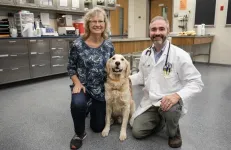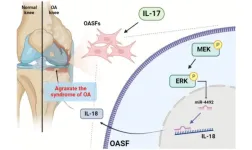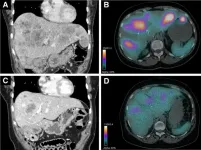(Press-News.org) A therapist-guided digital cognitive behavioural therapy reduced distress in 89 per cent of participants living with long-term physical health conditions, a new King’s College London study finds.
Researchers at the Institute of Psychiatry, Psychology & Neuroscience (IoPPN) at King’s College London found that people living with long-term conditions who received the therapist-guided digital programme called COMPASS showed a significant reduction in psychological distress (a combined score of anxiety and depression) 12-weeks after starting the study.
194 patients were recruited via long-term condition charities, including Crohn’s & Colitis UK, Kidney Care UK, MS Society, Shift.ms and Psoriasis Association in the UK. Half of the participants received the COMPASS programme and the other half did not. Both groups continued to access their usual charity support.
Overall, 89 per cent of participants who received COMPASS showed a clinically significant improvement in distress, compared to 45 per cent of those who did not have access to the programme. Alongside improvements in anxiety and depression, COMPASS was also associated with improved ability to undertake daily activities, reduction in illness-specific distress and better quality of life.
An estimated 15.4 million people in England have one or more long-term physical health conditions. 30 per cent of these individuals also have a co-occurring mental health condition. The study, published in Psychological Medicine, is the first randomised controlled trial to measure the effectiveness of COMPASS for managing anxiety and depression related to living with a long-term condition.
The research was part-funded by the National Institute for Health and Care Research (NIHR) Maudsley Biomedical Research Centre.
Dr Federica Picariello, post-doctoral health psychology research associate at King’s IoPPN and joint first author of the study, said: “Currently, the main treatments for anxiety and depression in people with long-term physical health conditions are psychotherapies, such as cognitive behavioural therapy, combined with medication. However, growing evidence shows that NHS Talking Therapies services are less effective for people with long-term physical health conditions. This may be because the challenges of living with the long-term physical health condition are often not central to the treatment approach. Our study shows that COMPASS offers an effective and potentially scalable intervention for people whose long-term physical health condition is, in fact, the key driver for their anxiety and/or depression.”
Developed with the support of the Mind and Body Programme at King’s Health Partners, COMPASS adapted standard cognitive behavioural therapy (CBT) protocols to integrate mental and physical health needs and specifically address the challenges of living with a long-term health condition. Using interactive pathways tailored to the individual’s needs, the programme helps people manage their symptoms of anxiety and depression alongside building strategies to manage stressors associated with living with a long-term condition, such as relapses or unpleasant treatments.
Dr Katrin Hulme, post-doctoral health psychology research associate at King’s IoPPN, and joint first author of the study, said: “This trial is the culmination of several years of work, starting in 2018; throughout the project, we developed the COMPASS programme and training for therapists, conducted user testing, got regulatory approval, launched in healthcare clinics and conducted this trial. The valuable insights of our patient and clinician representatives helped us create an online programme specifically tailored to help people manage the challenges that can come with living with a long-term health condition, and support healthcare services in addressing this unmet need.”
After 12 weeks, during which participants could complete any of the 11 interactive digital COMPASS sessions as home and receive up to five 30-minute support calls with their therapist, patients who received COMPASS reported greater improvements in most outcomes compared to those who did not have access to the programme.
Simon Brodie, a participant in the study said: “As a person with Multiple Sclerosis, my life had changed significantly as a direct result of my diagnosis. Due to thankfully being part of the COMPASS trial, I feel empowered and confident to deal with changes and emotions that life throws at you as a person with a long-term condition. COMPASS directs you to areas of your life you’d like to improve and explore by enabling skills, providing supported tools to guide you with along your journey. I highly recommend to those in the MS community as a best practice.”
As the treatment can be administered remotely, the study authors suggest an efficient delivery pathway could be through a national hub linked to self-referral through charities or the NHS, rather than setting up within each regional primary or secondary health service with limited resources. This delivery pathway could alleviate the demand on charities who already provide some essential support services and enable them to facilitate access to further specialised treatment.
The findings highlight that the use of digital interventions, such as COMPASS, which place the long-term physical health condition at the centre of treatment for anxiety and depression, are effective, scalable, and can be delivered with minimal therapist time.
Senior author, Professor Rona Moss-Morris, Digital Therapies theme lead at NIHR Maudsley BRC and Professor Psychology as Applied to Medicine at King’s College London, said: “Accessing psychological therapies which are tailored to the needs of people with long-term conditions is challenging for both the patient (due to time, travel, and/or mobility) and healthcare providers (due to treatment costs and availability of adequately trained therapists). As a CE-marked digital therapy with minimal therapist input, COMPASS offers a potential solution to overcome some of these challenges, whilst being an effective intervention to reduce psychological distress.”
This study was supported by the King’s Commercialisation Institute and Mind and Body Programme at King’s Health Partners. The authors wish to thank all the participants, and their patient and clinician representatives.
Ends
For more information, a copy of the paper or to arrange to talk to an author, please contact:
Alex Booth, Senior Communications and Engagement Manager (Monday and Tuesday), NIHR Maudsley Biomedical Research Centre, alex.booth@kcl.ac.uk.
Patrick O’Brien, Media Manager, Institute of Psychiatry, Psychology & Neuroscience, patrick.1.obrien@kcl.ac.uk
‘A randomised controlled trial of a digital cognitive-behavioural therapy programme (COMPASS) for managing depression and anxiety related to living with a long-term physical health condition’ (Federica Picariello, Katrin Hulme, Natasha Seaton, Joanna Hudson, Sam Norton, Abigail Wroe, Rona Moss-Morris) was published in Psychological Medicine. DOI: https://doi.org/10.1017/S0033291723003756
Notes to editors
About King’s College London and the Institute of Psychiatry, Psychology & Neuroscience King’s College London is amongst the top 35 universities in the world and top 10 in Europe (THE World University Rankings 2023), and one of England’s oldest and most prestigious universities. With an outstanding reputation for world-class teaching and cutting-edge research, King’s maintained its sixth position for ‘research power’ in the UK (2021 Research Excellence Framework).
King's has more than 33,000 students (including more than 12,800 postgraduates) from some 150 countries worldwide, and some 8,500 staff. The Institute of Psychiatry, Psychology & Neuroscience (IoPPN) at King’s is a leading centre for mental health and neuroscience research in Europe. It produces more highly cited outputs (top 1% citations) on psychiatry and mental health than any other centre (SciVal 2021), and on this metric has risen from 16th (2014) to 4th (2021) in the world for highly cited neuroscience outputs. In the 2021 Research Excellence Framework (REF), 90% of research at the IoPPN was deemed ‘world leading’ or ‘internationally excellent’ (3* and 4*). World-leading research from the IoPPN has made, and continues to make, an impact on how we understand, prevent and treat mental illness, neurological conditions, and other conditions that affect the brain.
www.kcl.ac.uk/ioppn | Follow @KingsIoPPN on Twitter, Instagram, Facebook and LinkedIn
The National Institute for Health and Care Research (NIHR) The mission of the National Institute for Health and Care Research (NIHR) is to improve the health and wealth of the nation through research. We do this by:
Funding high quality, timely research that benefits the NHS, public health and social care;
Investing in world-class expertise, facilities and a skilled delivery workforce to translate discoveries into improved treatments and services;
Partnering with patients, service users, carers and communities, improving the relevance, quality and impact of our research;
Attracting, training and supporting the best researchers to tackle complex health and social care challenges;
Collaborating with other public funders, charities and industry to help shape a cohesive and globally competitive research system;
Funding applied global health research and training to meet the needs of the poorest people in low and middle income countries.
NIHR is funded by the Department of Health and Social Care. Its work in low and middle income countries is principally funded through UK Aid from the UK government.
END
New digital therapy reduces anxiety and depression in people living with long-term physical health conditions
2024-02-14
ELSE PRESS RELEASES FROM THIS DATE:
Researchers edge closer to delivering personalized medicine to cancer patients
2024-02-14
For the first time, Purdue researchers prove that measuring mechanical motions in living cancer tissues is a viable and promising approach for predicting chemoresistance
Chemotherapy can save lives, but often a cancer patient may be resistant to their prescribed chemotherapy, which costs the patient valuable time. Chemoresistance is a topic that researchers need to understand better so that they can match the right type of chemo to the right patient, which is called personalized medicine.
An unusual pairing of veterinary scientists and physicists believe ...
Trail cameras track ‘critically low’ New York bobcat population
2024-02-13
CORNELL UNIVERSITY MEDIA RELATIONS OFFICE
FOR RELEASE: Feb. 13, 2024
Kaitlyn Serrao
607-882-1140
kms465@cornell.edu
Trail cameras track ‘critically low’ New York bobcat population
ITHACA, N.Y. – With thousands of strategically placed cameras covering more than 27,000 square miles in central and western New York, biologists have evidence that bobcat populations remain critically low in central and western New York state.
Despite reports of recent recoveries elsewhere, bobcat populations in New York State displayed low occupancy, ...
Virginia Tech researchers discover that blocking an essential nutrient inhibits malaria parasite growth
2024-02-13
Living organisms often create what is needed for life from scratch.
For humans, this process means the creation of most essential compounds needed to survive. But not every living thing has this capability, such as the parasite that causes malaria, which affected an estimated 249 million people in 2022.
Virginia Tech researchers in the College of Agriculture and Life Sciences found that by preventing the malaria parasite from scavenging fatty acids, a type of required nutrient, it could no longer grow.
“The key to this breakthrough is that we were able to develop a screening method for the malaria ...
Children's Hospital Los Angeles researchers uncover social and economic factors that influence acute liver failure in children—and ways to overcome them
2024-02-13
Imagine your healthy child gets sick—so sick that you take them to the emergency department. You are shocked to find out that their liver is failing, and they will need a transplant to survive. Studies show that their chances of survival are higher the faster they can get to a hospital that performs liver transplants. But what factors affect how quickly that happens?
Pediatric acute liver failure, also called PALF, is a life-threatening condition that emerges with very little warning in previously healthy children. It is rare, affecting about 5,000 children in the United States a year, and can result from viral ...
Uncovering insights about prostate cancer risk and genetic ancestry
2024-02-13
This study included larger groups of people from African, Hispanic and Asian ancestries than many other previous studies.
A recent study involving scientists from the U.S. Department of Energy’s (DOE) Argonne National Laboratory has uncovered insights into the prostate cancer risks of people from a variety of genetic ancestries. The project, which was led by the University of Southern California, included large increases in representation among men of African, Hispanic and Asian ancestries, that were contributed in part by an ongoing collaboration between the U.S. Department of Veterans Affairs (VA) and DOE as ...
A century of reforestation helped keep the eastern US cool
2024-02-13
American Geophysical Union
13 February 2024
AGU Release No. 24-5
For Immediate Release
This press release and accompanying multimedia are available online at: https://news.agu.org/press-release/a-century-of-reforestation-helped-keep-the-eastern-us-cool/
A century of reforestation helped keep the eastern US cool
Much of the U.S. warmed during the 20th century, but the eastern part of the country remained mysteriously cool. The recovery of forests could explain why
AGU press contact:
Liza Lester, +1 (202) 777-7494, news@agu.org (UTC-5 hours)
Contact information for the researchers:
Kim ...
IL-17 promotes IL-18 production in osteoarthritis synovial fibroblasts via…
2024-02-13
“This study provides novel insights into the pathogenesis of OA and suggests a potential therapeutic target in OA treatment.”
BUFFALO, NY- February 13, 2024 – A new research paper was published in Aging (listed by MEDLINE/PubMed as "Aging (Albany NY)" and "Aging-US" by Web of Science) Volume 16, Issue 2, entitled, “IL-17 promotes IL-18 production via the MEK/ERK/miR-4492 axis in osteoarthritis synovial fibroblasts.”
The concept of osteoarthritis (OA) as a low-grade inflammatory ...
New data speed record on optical fiber
2024-02-13
As data traffic continues to increase, there is a critical need for miniaturized optical transmitters and receivers that operate with high-order multi-level modulation formats and faster data transmission rates. In an important step toward fulfilling this requirement, researchers developed a new compact indium phosphide (InP)-based coherent driver modulator (CDM) and showed that it can achieve a record high baud rate and transmission capacity per wavelength compared to other CDMs. CDMs are optical transmitters used in optical communication systems that can put information on light by modulating the amplitude and phase before it is transmitted through optical fiber.
“Services that require ...
UBCO researchers get to the bottom of non-invasive gut tests
2024-02-13
New research from UBC Okanagan could make monitoring gut health easier and less painful by tapping into a common—yet often overlooked—source of information: the mucus in our digestive system that eventually becomes part of fecal matter.
Correct, what’s in our poop.
Researcher Dr. Kirk Bergstrom and post-graduate student Noah Fancy of UBCO's Biology department discovered a non-invasive technique to study MUC2, a critical gut protein, from what we leave behind in the bathroom.
“MUC2 is like the silent star in our guts. It’s constantly working ...
Radiopharmaceutical therapy controls symptoms and reduces medications in insulinoma patients
2024-02-13
Reston, VA—Peptide receptor radionuclide therapy (PRRT) is effective for clinical control of symptomatic metastatic insulinomas, according to new research published in the February issue of The Journal of Nuclear Medicine. In the largest study to date of metastatic insulinoma patients treated with PRRT, more than 80 percent of patients had long-lasting symptom control, and nearly 60 percent were able to reduce the use of other drugs to treat the disease.
Metastatic insulinoma is a rare malignant neuroendocrine tumor characterized ...





